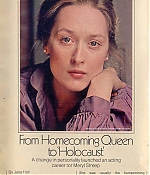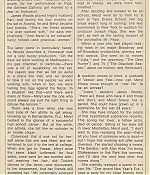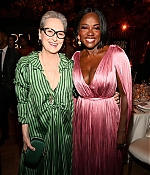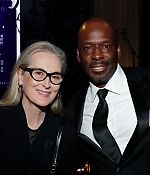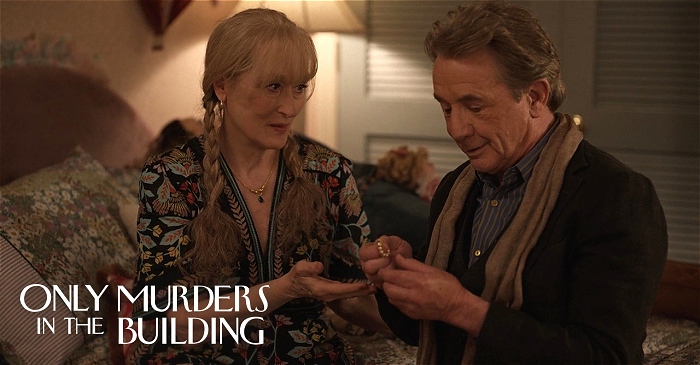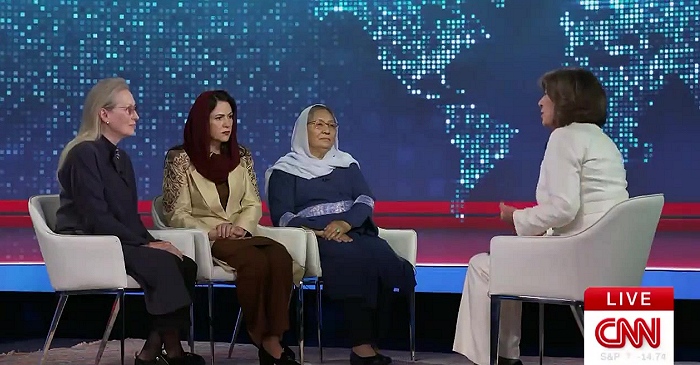
|
From Homecoming Queen to Holocaust
TV Guide ·
June 24, 1978
· Written by Jane Hall
|
Every high school had one. More often than not, she had naturally golden hair when everyone else had to resort to artifice. Her eyes were cerulean blue, and her clothes all matched her shoes. She was usually the homecoming queen. And on top of that, she was smart, too. The girl everyone envied. That was Meryl Streep, and in some respects her life doesn’t seem to have changed much. Her hair is as blonde as ever, her eyes as blue, and she’s getting more popular all the time.
These days it’s the critics she’s drawing cheers from – recently, for example, for her performance as Inga, the German Catholic girl married to a Jew in “Holocaust”. James Woods played Inga’s husband Karl, and during the four months on the set in Austra, he and Meryl became fast friends. “She’s the finest actress I’ve ever worked with,” he says emphatically. “And Meryl is an extraordinary honest – and gracious – woman”. The latter came in particularly handy. As Woods describes it, “Holocaust” was not a very happy production. “On the days we were working at Madhausen – the gas chamber in particular – there was a lot of squabbling on the set. The reason was that we felt so awful in a place like that, and we tended to take it out on the people we were working with, when in fact, we were feeling this rage against the Nazis. In a situation like that – and there were many of them – Meryl was the one who could always say just the right thing to defuse the tension.” There was a time when she was less sure of her ability to get along. Growing up in Bernardsville, N.J., Meryl basked in the glories of a successful high-school career. But all the while, she admits, she felt like an outsider in an inside clique. Convinced that it was not for herself alone that she was liked, she determined to put it to the test at college. When she got to Vassar, Meryl wore the same black turtleneck for four years, once went for two months without washing her hair, did Turkish dances in the dorm – and discovered, to her amazement, that her friends still accepted her. “My personality emerged at Vassar,” she says
Her experience there gave her firsthand knowledge to bring to her performance in “Uncommon Women and Others”, seen on PBS last month. The play takes up the lives of five college friends several years after graduation. “‘Uncommon Women’ is wonderfully accurate,” says Meryl, laughing, “except at Vassar, we were more foul-mouthed.” After deciding she wanted to be an actress, Meryl went on to train for a year at Yale Drama School. Her big break wasn’t long in coming: she was summoned to New York to audition for producer Joseph Papp. She won the part, as well as the lasting respect of the polymathic Mr. Papp. Within a year she had played leading roles in six major Broadway and off-Broadway productions, winning several awards. She went on to movies (“Julia” and the upcoming “The Deer Hunter”) and TV (“The Deadliest Season”, about ice hockey; and “Holocaust”). A question comes to mind: a graduate of Vassar and Yale – how can Meryl Streep know enough of “real life” to be an actress? “Listen,” explains James Woods, “there are those who have it and those who don’t, and Meryl Streep has it, period. She could have grown up in a submarine for the last 28 years.” She may have longed for the peace of that hypothetical submarine recently. This spring her lover, a fellow actor, died of cancer. Sitting in her bare loft in lower Manhattan, Meryl said, “I don’t want to stop replaying the past – that’s all you have of someone who is dead – but I hope that working will offer some diversion. I’ve started shooting a movie, “The Senator”, with Alan Alda. I’m doing Shakespeare in the Park this summer, and I’ll take the next best offer that comes along.”
She wistfully replayed a scene in her own life. “One recent New Year’s Eve, I gave a party for my close friends from Vassar, plus husbands, lovers and friends. One of the women used a school expression like ‘Gross me out’ – and the years evaporated. Somehow it seemed as if nothing had changed.”

